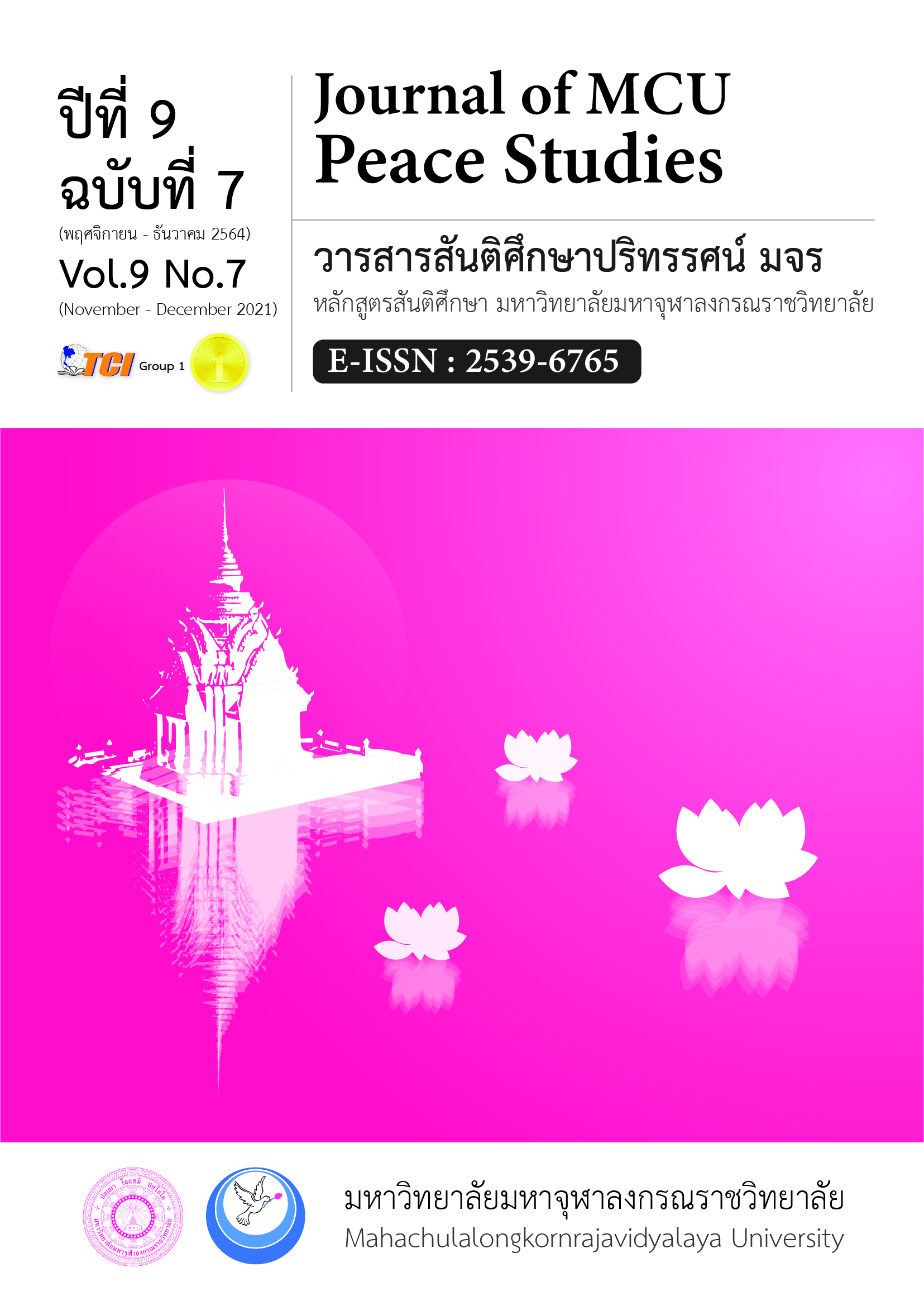ทุนทางสังคมกับการพัฒนาสินค้าเชิงวัฒนธรรม: กรณีศึกษาวิสาหกิจชุมชนเกลือสมุนไพรลาดใหญ่ จังหวัดสมุทรสงคราม
Main Article Content
บทคัดย่อ
บทความวิจัยครั้งนี้มีวัตถุประสงค์เพื่อศึกษาถึงสาเหตุที่ก่อให้เกิดทุนทางสังคมในการพัฒนาสินค้า เชิงวัฒนธรรมของวิสาหกิจชุมชนเกลือสมุนไพรลาดใหญ่ จังหวัดสมุทรสงคราม การวิจัยครั้งนี้เป็นการวิจัยเชิงคุณภาพ ด้วยการรวบรวมข้อมูลจากการสนทนากลุ่ม ควบคู่ไปกับการวิจัยเอกสาร ต่าง ๆ ที่เกี่ยวข้อง และนำมาวิเคราะห์ด้วยแนวคิดทุนทางทางสังคม กลุ่มตัวอย่างที่ใช้ในการศึกษาเป็นผู้นำและสมาชิกของกลุ่มวิสาหกิจชุมชนเกลือสมุนไพรลาดใหญ่ วิเคราะห์ข้อมูลโดยใช้ การวิเคราะห์เนื้อหา แล้วบรรยายวิเคราะห์ในเชิงพรรณนา ผลการวิจัยพบว่า 1) ภัยคุกคามจากการพัฒนาเป็นสาเหตุของการดึงคุณค่าจากเกลือในฐานะของทุนภายในชุมชน มาพัฒนาเป็นสินค้าเชิงวัฒนธรรม อย่างไรก็ตาม ภายในชุมชนลาดใหญ่ยังมีทุนทางวัฒนธรรมอีกหลายสิ่งที่กลุ่มผู้ประกอบการวิสาหกิจชุมชนยังไม่ได้นำมาพัฒนา 2) ปัจจัยสาเหตุของทุนทางทางสังคมที่ก่อให้เกิดความไว้วางใจ บรรทัดฐานการเกื้อกูลระหว่างกันและกัน และเครือข่าย มีความสัมพันธ์กับการพัฒนาสินค้าเชิงวัฒนธรรม ได้แก่ ความสัมพันธ์เชิงเครือญาติ ศักยภาพของผู้นำ โครงสร้างเชิงสถาบัน และบรรทัดฐานความพอเพียง 3) ความสัมพันธ์เชิงเครือญาติ ศักยภาพของผู้นำ โครงสร้างเชิงสถาบัน และบรรทัดฐานความพอเพียง เป็นสาเหตุของการก่อให้เกิดทุนทางสังคมรูปแบบหนึ่งที่เป็น ปฐมฐานแห่งทุนทางสังคมในการพัฒนาสินค้าเชิงวัฒนธรรมของกลุ่มวิสาหกิจชุมชนเกลือสมุนไพรลาดใหญ่
Article Details

อนุญาตภายใต้เงื่อนไข Creative Commons Attribution-NonCommercial-NoDerivatives 4.0 International License.
ทัศนะและความคิดเห็นที่ปรากฏในบทความในวารสาร ถือเป็นความรับผิดชอบของผู้เขียนบทความนั้น และไม่ถือเป็นทัศนะและความรับผิดชอบของกองบรรณาธิการ ยินยอมว่าบทความเป็นลิขสิทธิ์ของวารสาร
เอกสารอ้างอิง
Coleman, J. S. (1988). Social Capital in the Creation of Human Capital. In Social Capital: A Multifaceted Perspectives. Dasgupta, P. and Serageldin, I. eds. Washington D.C.: World Bank.
Department of Agricultural Extension. (2018). Sub-district Agricultural Development Plan 2018- 2021. Retrieved July 15, 2020, from http://mueang.samutsongkham.go.th/2017.pdf
Griswold, W., & Wright, N. (2004). Cowbirds, locals, and the dynamic endurance of regionalism. American. Journal of Sociology, 109(6), 1411-1451.
Hiramatsu, M. (2008). One Village, One Product Spreading throughout the World. Oita Japan: Office: Oita OVOP International Exchange Promotion Committee.
Members of Lad Yai Herbal Salt Community Enterprise. (2020). Focus Group. December, 9.
Naomi, S., & Koichi, M. (2008). Knowledge and Networking Strategies for Community Capacity Development in Oyama-machi: An Archetype of the OVOP Movement. Journal of OVOP Policy, 1(6), 5-20.
Natsupha, C. (1991). Thai Culture and Social Change. Bangkok: Chulalongkorn Publishing University.
Natsupha, C. (2001). Community Economy Concept, Theoretical Proposal in Different Social Contexts. Bangkok: Amarin Printing and Publishing.
Nobuyoshi, N., & Lutful, K. (2005). One Village One Product Movement: Success Story of Rural Development in Japan and Learning Points for Bangladesh. The Economic Science,52(4), 71-92.
Putnam, R. D. (1993). The prosperous Community: Social Capital and Public Life. Retrieved May 8, 2012, from http://www.philia.ca.
The Office of the Royal Development Project Board. (2015). The Philosophy of Sufficiency Economy the Greatest Gift from the King. Bangkok: Amarin Printing and Publishing.
Wasi, P. (1998). National Strategy for Social and economic strength Morality. Bangkok: MohChao-Ban Publishing House.
World Bank. (2002). What is Social Capital.Retrieved May 8, 2012, from http://www.worldbank.org.
Yamagami, S., & Fujimoto, T. (2012). The Prototype for the One Village One Product Movement: Community Development Initiatives in Oyama Town. In K. Igusa (Eds.). The OVOP Movement and Local Development in Asia- How to Nurture Rural Entrepreneurs in the
Developing World. Oita: Ritsumeikan Asia Pacific University.
Yamazaki, J. (2010). A Comparative Analysis of One Village One Product (OVOP) and its Replicability in International Development. (Master’s Thesis). Institute of Social Studies Hague. Netherland.


